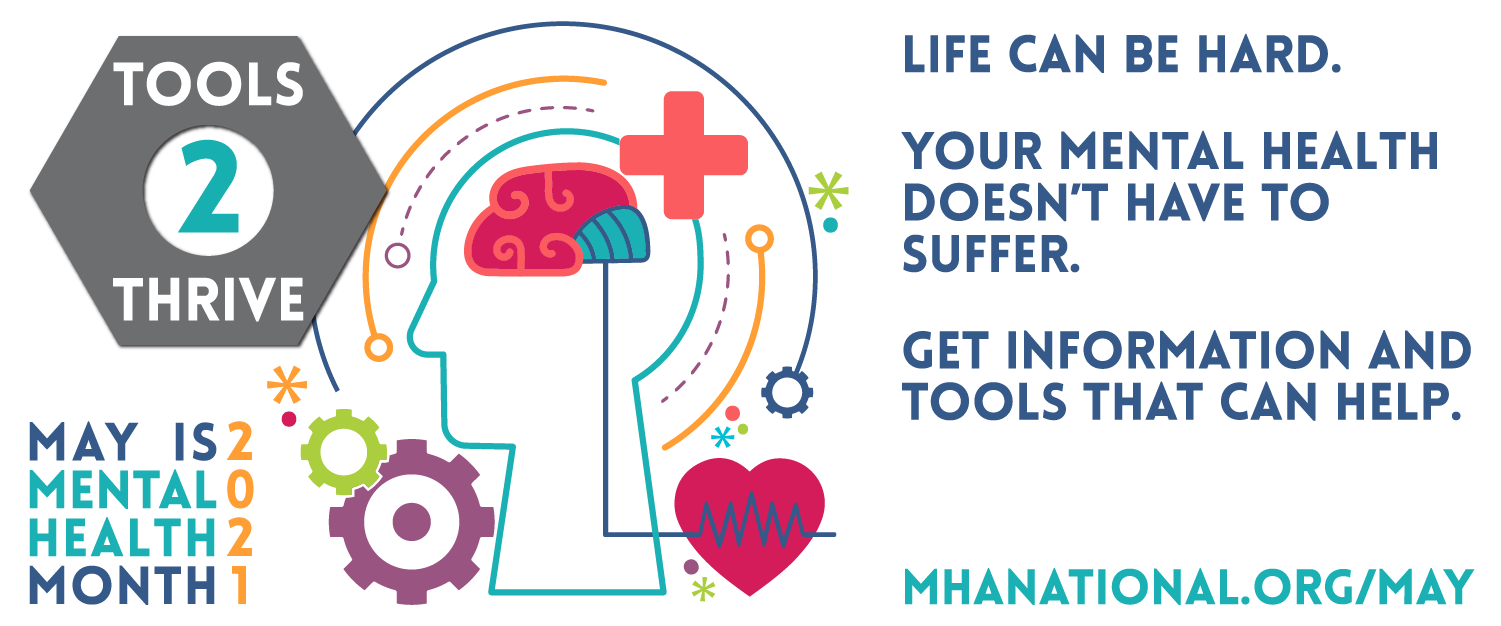|
This past year presented so many different challenges and obstacles that have tested our strength and resiliency. The global pandemic forced us to cope with situations we never even imagined, and a lot of us struggled with our mental health as a result. The good news is that there are tools and resources available that can support the well-being of individuals and communities. Now, more than ever, we need to combat the stigma surrounding mental health concerns. That is why this Mental Health Awareness Month the National Center for Farmworker Health (NCFH) is highlighting Mental Health America’s 2021 Mental Health Month Toolkit, #Tools2Thrive. The #Tools2Thrive Toolkit offers individuals ideas of what they can do throughout their daily lives to prioritize mental health, build resiliency, and continue to cope with the obstacles of COVID-19.
If you found your mental health was impacted this past year, you are not alone. In fact, of the almost half a million individuals that took the anxiety screening at MHAscreening.org, 79% showed symptoms of moderate to severe anxiety. However, there are practical tools that can help improve your mental health but finding tools that help you thrive and working on your mental health is an ongoing process. Change does not happen overnight. Instead, by focusing on small changes, you can move through the stressors of the past year and develop long-term strategies to support yourself on an ongoing basis. A great starting point for anyone who is ready to start prioritizing their mental health is to take a mental health screening at MHAscreening.org. It’s a quick, free, and confidential way for someone to assess their mental health and begin finding hope and healing. Ultimately, during this month of May, NCFH wants to remind everyone that mental illnesses are real, and recovery is possible. By developing your own #Tools2Thrive, it is possible to find balance between life’s ups and downs and continue to cope with the challenges brought on by the pandemic. For more information and to download the #Tools2Thrive Toolkit, click here. NCFH also has additional resources available on our Mental Health Hub. #Tools2Thrive #MentalHealthAwarenessMonth #MHM2021
0 Comments
An estimated 88 million American adults—more than 1 in 3—have a condition called prediabetes, which means a person’s blood sugar levels are higher than normal, but not yet high enough yet to be diagnosed as type 2 diabetes. When you have prediabetes, there are steps you can take to eat healthier, move more, and manage your stress to reduce your risk of developing type 2 diabetes. The CDC’s National Diabetes Prevention Program (National DPP) lifestyle change program can help you make these changes.
The lifestyle change program, such as the National Diabetes Prevention Program (National DPP) , is inclusive for everyone who has prediabetes. This May for Mental Health Awareness Month, CDC-led National DPP is taking the time to recognize lifestyle change program participants who don’t let challenges or disabilities related to mental health stand in their way of reducing their risk for developing type 2 diabetes. Take lifestyle change program participant Joe for example. Joe has a mental health disability called bipolar disorder, which causes unusual shifts in his mood, energy, activity levels, concentration, and ability to carry out day-to-day tasks. To manage his bipolar disorder, he takes six medicines daily, many of which come with side effects, such as weight gain, extreme fatigue, and difficulty concentrating. Joe had struggled with his weight, and when he found out from his doctor that he had developed prediabetes, it was hard for him to imagine what he could do to make healthy lifestyle changes. In addition to the side effects from his medicines, an increase in mental or physical activity makes him more likely to have panic attacks. With these challenges to overcome, Joe could have given up. Instead, Joe wouldn’t let anything stop him from improving his health to reduce his risk for developing type 2 diabetes. That’s when Joe joined a local lifestyle change program and met his coach, Lonna. As a coach, Lonna often works with participants who have mental health disabilities, teaching them strategies for making healthy lifestyle changes in ways that work for them. For example, since Joe can’t increase his physical activity to lose weight, Lonna helped him focus more on healthy eating. She recommended using measuring cups to help with portion control. Joe uses the cups to measure out each meal and snack to make sure that he doesn’t overeat. “Before putting the food on my plate, I put it into a one-cup measuring cup,” says Joe. “If I have pasta, I know that I can only have one or two cups. A cup of pasta is still a lot of pasta – I didn’t realize how much it was!” Joe says he learned a lot about food and nutrition during the program and how to make better choices to improve his health. Using what he learned, he was able to lose 30 pounds! “It’s nice for people to tell me that I look better or I look good,” says Joe. “I was proud of myself. My parents were proud of me. Lonna would weigh me and see I lost two or three pounds and I felt good about my success.” Joe shows the strength and resilience of so many people who have overcome barriers to improve their health. He has successfully lost weight and lowered his triglycerides, cholesterol, and blood sugar levels. He says that anyone with prediabetes can reduce their risk for type 2 diabetes through the lifestyle change program, like he did. No matter what obstacles you face on the road to better health, the most important thing is to keep working at it and never give up! Challenge yourself to better health! Learn more about how you can be like Joe and reduce your risk for developing type 2 diabetes. Visit the National Diabetes Prevention Program (National DPP) lifestyle change program for more information. Get started on your health journey today. |
The National Center for Farmworker HealthImproving health care access for one of America's most vulnerable populations Archives
March 2024
Categories
All
|



 RSS Feed
RSS Feed